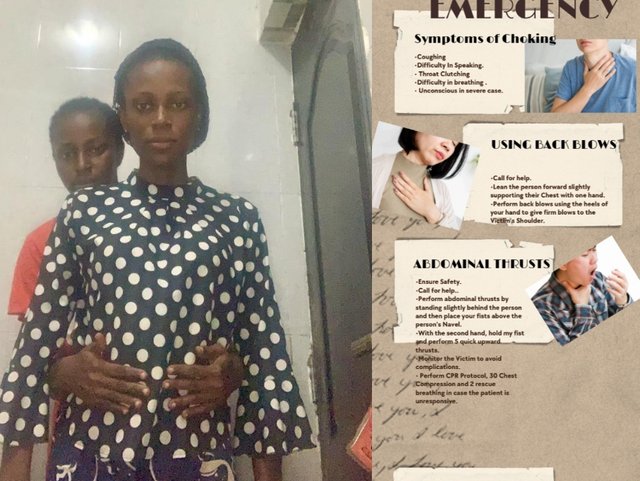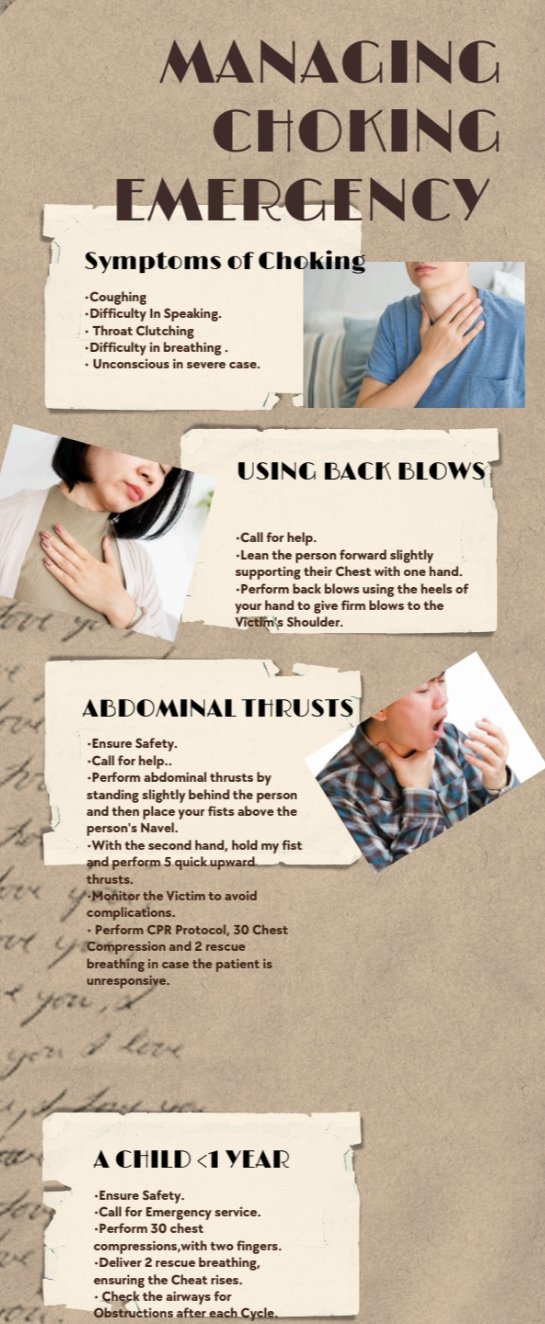"SLC21/WK5: Choking and Airway Obstruction: A Complete Guide to Life-Saving First Aid Techniques " by @rossnenye
Hello everyone, good evening to you all. It was quite an educating class and I learnt a lot as always. My thanks to the Teachers, you guys are doing well.

| Describe in detail the mechanism of choking. What happens physiologically when the airway is obstructed? List and explain the distinctive features or signs of choking, including how to differentiate between partial and complete obstruction. |
|---|
| Definition of Choking |
|---|
Choking is a Medical Condition that occurs when a foreign object or food particles, stuck in the throat and obstructs the flowing of air in the airways to the Lungs. When this happen, one will have difficulty in breathing because of restriction of airflow. Choking is in two forms, it can be Partial or Complete Choking.
| Mechanism of Choking |
|---|
- Increase respiratory responses
The obstruction will cause increase resistance to airflow, making breathing difficulty.
- Decreased lung Volume
The lungs would be unable to expand fully due to decreased airflow thereby leading to decreased Lung Volume.
- Increased heart beat rate
Due to the fact that the heart is trying to give Oxygen to body tissues, they would be increased heartbeat.
- Vasoconstriction
The blood vessels directs blood circulation to Vital Organs.
- Hypoxia
All the body issues will begin to encounter lack of Oxygen due to the airflow restriction. In case of prolonged Obstruction, it can lead to organ damage.
If the Obstruction is as a result of food Allergy, the following will occur.
- Release of histamine
The Allergy will trigger the release of histamine, which is a Chemical substance that makes the blood vessels to dilate and smooth muscle to contract.
The smooth muscle contraction will lead to resistance in airways thereby making breathing difficulty. The body tissues will also experience Hypoxia which is lack of Oxygen.
| Common Characteristics/ Symptoms of Choking |
|---|
- Cyanosis
This is one of the major symptom of Choking which occurs in severe cases when the skin colour changes to blue.
- Throat Clutching
This is usually done by victims, they use their hands to clutch to their throat where the choking is occuring.
- Coughing
During choking, the Victim finds it quite hard to breathe in Oxygen due to the restricted airflow and this usually result to Coughing. When the Victim coughs out properly, it's Partial Choking, but when he finds it difficult to cough then it's Complete Choking.
- Inability to speak
The Victim might experience difficulty in speaking due to lack of air.
- Unconscious
This usually occurs in worse scenarios, the victim might lose consciousness because of lack of Oxygen flow to the brain.
- Difficulty in breathing
The Victim has difficulty in breathing because of airflow restriction. In Partial Choking the person can make wheezing sound but complete Choking wheezing sound is not made.
Difference between Complete Choking and Impartial Choking
| Aspect | Partial Choking | Complete Choking |
|---|---|---|
| Definition | The airways is Partially blocked, therefore airflow is limited. | The airways is completely blocked, thereby preventing airflow. |
| Coughing | The Victim coughs with difficulty | The Victim can't Cough or make a sound. |
| Speaking Level | The Victim can utter a Word | The Victim can't utter a Word. |
| Breathing | The Victim can make Wheezing sound | There is no Wheezing sound. |
| Danger Level | It's less dangerous and be resolved by Coughing | It's quite dangerous and requires immediate action |
| Conscious | The Victim is Conscious but disoriented. | The Victim is unconscious and disoriented. |
| Q2: Demonstrate the Heimlich maneuver on a sibling, child, or peer (using safe simulations). Attach pictures of the demonstration and explain the procedure in detail, highlighting key points such as positioning, technique, and safety precautions. |
|---|
- Safety
I would ensure the DRABC Protocol by ensuring my safety and that of the Victim.
- Identity the Emergency
Using the Heimlich Maneuver, I would identify that the person is choking by checking out for signs like Coughing, difficulty in breathing, difficulty in sleep etc.
- First Aid Protocol
So I will be using my sister, an adult to show the steps to Heimlich Maneuver, using the Abdominal thrust.
- I would stand slightly behind her and wrap my arm around her waist.

- Make a fist with one hand and then place it above her Navel.

- With my second hand, I would grip my fist.

I would perform 5 quick upward thrusts on her.
In Case of Complications and the Victim is unconscious, then I would perform CPR protocol on the person, 30 Chest Compression and 2 rescue breathing.
I would also check out her mouth for visible obstruction after each Cycle.
Aftercare
Once the Obstruction is out, I would monitor her Incase of any airways Injury.
I would also ensure she seeks medical Attention inorder to avoid Complications.
Precautions
While performing the Abdominal thrusts, I would avoid excessive force inorder to prevent injury or Complications.
| Q3: Consider a situation where you encounter a conscious person choking on food. They are showing signs of cyanosis and restricted breathing. Describe how you will prioritize and manage the situation. Write each step in detail, from identifying choking to performing first aid and ensuring the victim's safety. Include how you would take control of the situation, communicate with bystanders, and seek medical assistance if needed. |
|---|
- Ensure Safety
I would ensure my Safety and that of the Victim.
- Identity the Choking Situation
I would ensure that the person is choking by looking out for Choking symptoms like Wheezing sound, difficulty in breathing, Coughing and inability to Speaking.
- Take control of the Situation.
I would be calm and also calm the victim down and then take charge of the situation.
- Bystanders
I would ask the bystanders at that place for help, I delegate activities like asking one of them to call the Emergency number of my Country. asking him to tell them the state of the person's condition and the location. The other bystanders will be on standby Incase I need any further assistance.
- Coughing
If the victim is responsive, I would advise the victim to Cough to know if he can dislodge the Object but if he can't, then I would position the person well for Heimlich Maneuver.
Performing the Heimlich Maneuver*
First Aid Protocol
Using the Abdominal thrusts, I would stand slightly behind him and wrap my arm around his waist.
Make a fist with one hand and then place it above his Navel.
With my second hand, I would grip my fist.
I would perform 5 quick upward thrusts on him.
I would continue alternating the Upward thrusts on him for 5 times until the Obstruction is out.
Follow up
Once the Obstruction is out, I will check his breathing to ensure it's normal.
I would also stay and monitor the Victim incase of any Complications. I would also stay with the victim until help comes.
Upon the arrival of the Medical professional, I would brief them on the Situation.
In Case of Complications and the Victim is unconscious, then I would perform CPR protocol, perform 30 chest compressions and deliver 2 rescue breathing. I would also check out the person's mouth for any visible obstruction after each Cycle.
Precautions
While performing the Abdominal thrusts, I would avoid excessive force inorder to prevent injury or Complications.
Q4: Create an infographic (visual illustration) on managing choking emergencies.
Your design should include key steps, such as how to identify choking, perform back blows, abdominal thrusts, and manage choking in special cases (e.g., infants, pregnant individuals). Ensure your infographic is clear, visually engaging, and easy to understand.

Thanks for reading my post, I invite @joymm, @ovulama and @ukpono to participate in this contest.
Student Name: @rossnenye
Overall grade: 9
Plagiarism Check: Pass
AI Use: No
General Feedback: The student has shown a good understanding of this week's course. There were a few shortcomings which I'm sure will be avoided in the upcoming posts.
Thank you.
Regards,
@huzaifanaveed1
1.98 SBD,
1.63 STEEM,
8.15 SP
Wow!
This is detailed.
You seem to know much on first aid safety. Are you a nurse?
No dear, thanks dear